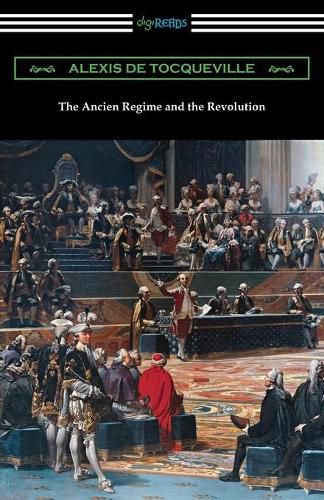Readings Newsletter
Become a Readings Member to make your shopping experience even easier.
Sign in or sign up for free!
You’re not far away from qualifying for FREE standard shipping within Australia
You’ve qualified for FREE standard shipping within Australia
The cart is loading…






This title is printed to order. This book may have been self-published. If so, we cannot guarantee the quality of the content. In the main most books will have gone through the editing process however some may not. We therefore suggest that you be aware of this before ordering this book. If in doubt check either the author or publisher’s details as we are unable to accept any returns unless they are faulty. Please contact us if you have any questions.
First published in French in 1856, French diplomat and political scientist Alexis de Tocqueville’s The Old Regime and the French Revolution is one of the most influential treatises written on the French Revolution. Tocqueville begins by tracing the causes of the French Revolution to the structure of society of France prior to the Revolution, what he terms the Ancien Regime . Tocqueville rejected the notion that the Revolution was a radical transformation of French society. He instead suggests his theory of continuity, specifically that the Revolution was not an attempt to change the nature of society in a truly fundamental way, but to wrest control from the ancient, feudal landed aristocracy and replace those outdated institutions with a representative democracy. He makes the important observation that the government of Napoleon was autocratic, strongly centralized, and thus not much different from the Ancien Regime . Tocqueville was a fierce proponent of social institutions based on freedom and equality rather than on the rigid social hierarchy of the feudal social system of the Middle Ages, a system that was increasingly untenable in the age of enlightenment. Tocqueville’s treatise remains a timely and important work on social class, revolution, and democracy. This edition is printed on premium acid-free paper and follows the translation of John Bonner.
$9.00 standard shipping within Australia
FREE standard shipping within Australia for orders over $100.00
Express & International shipping calculated at checkout
This title is printed to order. This book may have been self-published. If so, we cannot guarantee the quality of the content. In the main most books will have gone through the editing process however some may not. We therefore suggest that you be aware of this before ordering this book. If in doubt check either the author or publisher’s details as we are unable to accept any returns unless they are faulty. Please contact us if you have any questions.
First published in French in 1856, French diplomat and political scientist Alexis de Tocqueville’s The Old Regime and the French Revolution is one of the most influential treatises written on the French Revolution. Tocqueville begins by tracing the causes of the French Revolution to the structure of society of France prior to the Revolution, what he terms the Ancien Regime . Tocqueville rejected the notion that the Revolution was a radical transformation of French society. He instead suggests his theory of continuity, specifically that the Revolution was not an attempt to change the nature of society in a truly fundamental way, but to wrest control from the ancient, feudal landed aristocracy and replace those outdated institutions with a representative democracy. He makes the important observation that the government of Napoleon was autocratic, strongly centralized, and thus not much different from the Ancien Regime . Tocqueville was a fierce proponent of social institutions based on freedom and equality rather than on the rigid social hierarchy of the feudal social system of the Middle Ages, a system that was increasingly untenable in the age of enlightenment. Tocqueville’s treatise remains a timely and important work on social class, revolution, and democracy. This edition is printed on premium acid-free paper and follows the translation of John Bonner.